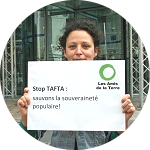It’s not everyday that trade deals make headline news but it happened last week after the European Commission’s announced long-awaited plans to reform the controversial investor-state dispute settlement mechanism (ISDS) of the Transatlantic Trade and investment Partnership (TTIP).
The mechanism, which grants foreign investors exclusive rights to sue governments when changes in regulation get in the way of their profits, has resulted in an unprecedented public outcry. This is a major hurdle in the effort to rally hearts and minds behind the TTIP project.
To appease the debate, the European Commission has engaged in a major rebranding exercise to promote a new ‘investment court system’ supposedly based on fairness, transparency and democratic principles.
Unfortunately, the proposal did not impress civil society or critical observers – the European Greens described it as an attempt to “put lipstick on a pig”. Despite introducing procedural reforms, the fundamental flaws of the system, in particular the granting of privileges to foreign investors over the rest of society, remain in place.
In any case, this recent development illustrates the Commission’s effort to use the positive value of transparency to appeal to the public. Openness and transparency in the negotiations were the key commitments of EU Trade Commissioner Cecilia Malmström when she took office about a year ago.
“We need to negotiate this agreement in a different way to an ordinary trade agreement,” she said. “That means that this agreement needs to be negotiated openly and transparently. Everyone who is interested must have a chance to comment – consumers, workers, environmental activists, entrepreneurs, private citizens and the people’s representatives.”
The press heralded this “unprecedented” move and it didn’t take long for business groups to applaud the “most transparent trade negotiations in history”. Only civil society groups, a handful of politicians and large swathes of the general public seemed to disagree. They recognised a significant discrepancy between the “walk” and the “talk”.
The TTIP negotiations continue to fall far behind what is necessary to ensure that the public really knows what is going and is able to influence the process.
Under Malmström, there may have been a few cosmetic reforms, but one reality remains: TTIP is being negotiated behind closed-doors, and with the exception of a few leaks, it is impossible for citizens to access the negotiation texts and get a full understanding of what is being negotiated on their behalf.
Adding insult to injury are reports of a meeting with member state representatives detailing clear measures instructed by Malmström herself to further restrict access to TTIP documents and Germany’s critical response to the move. Written reports of each negotiation round will no longer be sent electronically to officials. Instead, they will be made available in the European Commission reading room in Brussels.
This is unlikely to foster the kind of lively debate promised by the Commissioner – particularly as most diplomats get access to all documents in the high-security reading rooms of US embassies around Europe, while MEPs have access to a fraction of these documents. In addition, the Commission advisory group on TTIP is not allowed to share any of the documents consulted in reading rooms with other experts and colleagues – this is a bare minimum if they are supposed to make meaningful contributions to the process.
In a rather awkward move, Commissioner Malmström has refuted introducing any new restrictions, claiming that: “the only changes in my trade policies will be more openness, not less”. A natural way to do so would be to start by following the recommendations made by the European Ombudsman following her own-initiative enquiry on the TTIP talks. However, it seems the Commission is moving in the exact opposite direction.
The ability of the Commission to turn a blind eye to its own contradictions when it comes to key aspects of the negotiations, such as the plan to grant foreign investors special privileges and the general lack of openness of the process, has reached unprecedented levels, revealing the incessant double-speak at the heart of this process. This is something that will undoubtedly continue to fuel opposition to the talks.









